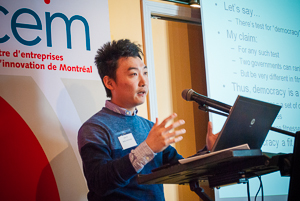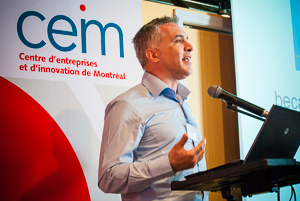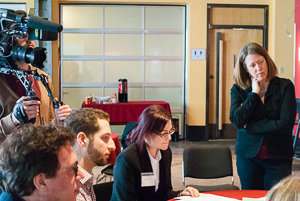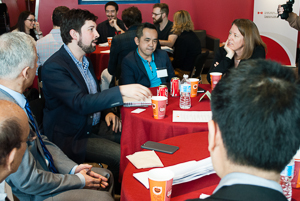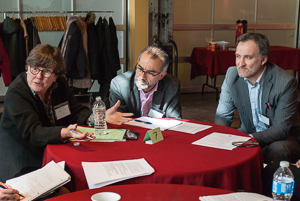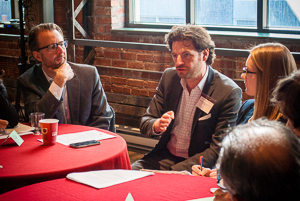Pierre-Emmanuel Moyse, Director of the CIPP, and Allison Christians, holder of the Stikeman Chair in Tax Law, have been investigating how tax and intellectual property laws impact innovation. We follow up on the latest developments.
By Stacey Smydo, 3L & Jacob Heyka, 2L
Student researchers with the CIPP and the Stikeman Chair
Previously at the CIPP and Stikeman Chair in Tax Law…This has been an outstanding year for the CIPP! In January, the CIPP and CIGI organized a conference on the influence of the TPP on IP rights and foreign investment; in April, Professor E. Richard Gold’s team successfully stopped gene patents from limiting access to life-saving cancer medication; and most recently, the CIPP and the Stikeman Chair in Tax Law entered a new phase of their research project on “Regulating Innovation: Law and the Creative District” (see Create, Regulate, Innov8 in the January edition of Focus online). |
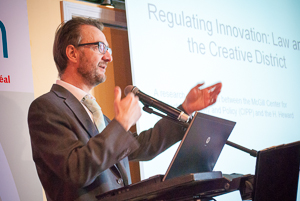
|
For the past two years, Professor Pierre-Emmanuel Moyse, Director of the Centre for Intellectual Property Policy, and Professor Allison Christians, Stikeman Chair in Tax Law, have been investigating how law, particularly tax and intellectual property law, impacts innovation.
With their Regulating Innovation Project, they have been researching and conducting interviews with industry stakeholders and government officials to learn more about how legal institutions affect innovation on the ground.
Their project examines the legal regimes around regulation of innovation in Montreal, Silicon Valley, and Israel’s “Silicon Wadi”.
In May, they revealed their findings to Montreal and Quebec’s innovation community in an “Innovation Workshop” hosted at the Centre d’entreprises et d’innovation de Montreal to test their hypotheses and gain new insights as they embark upon the next phase of the project.
Innovation workshop: engaging with the community
The main hypotheses are that non-compete clauses (NCCs) have a chilling effect on innovation because they prevent the migration of know-how in the creative industries from company to company. On the tax side, the findings thus far suggest that tax incentives are not a primary driver of innovation but they are often used for political purposes in attempts to attract creativity and innovation to a particular geographic location. However, the evidence of their success in this effort is mixed.
It seems that innovators are more attracted by other factors, such as a talented work pool developed through broad public support for research, education, and migration; quality of life for managers and employees; and a social safety net that protects risk-taking, including access to healthcare and strong public institutions of governance, education, and infrastructure.
Offering tax incentives in some cases may attract a given industry to a given place, but at a high cost. Even so, tax incentives are irresistible to lawmakers and they continuously crop up in budget bills. The so-called “patent box” introduced in Quebec is a recent example: it would reward successful IP-intensive industries with a tax break, but since it is based on profits, it doesn’t do much of anything for the creative startup in the initial investment process.
The CIPP and Stikeman Chair in Tax Law teams presented these hypotheses and the research done up to this point. Then the participants engaged in small group discussions centred around the core industries of interest to the research project: aeronautics, video games and film.
Participants were primarily from these “creative industries” in the Montreal community, although some came from Toronto and Ottawa. They shared their experiences in these other jurisdictions to help the research team continue to develop its thoughts on these topics. Participants were eager to engage and share their thoughts and several important themes emerged from the discussions that took place during the workshop.
How are creative industries impacted by NCCs and tax incentives?
We found that NCCs are still used in creative industries in Montreal, but mostly at senior management levels. Participants were intrigued by the possibility of associating a cost with NCCs. In the film industry in particular, NCCs seem to be used more for those creating hardware and less in content creation (where non-disclosures are more widely used). IP was also mentioned as a possible site for tax policy. For example, Israel prohibits the transfer of technology to foreign entities when said technology (IP) is the result of research funded via governmental programs. The grant recipient may have to seek approval from the OSR Research Committee and pay a redemption fee.
On the tax side, while tax programs are not in sync with the funding needs of creative industries, available tax incentives are considered heavily once a company has set up shop in Montreal. However, it is very difficult to take advantage of some tax programs. They require much effort to apply for and companies have to disclose such a significant portion of a company’s books that it is often not worth it to claim tax credits, particularly for SMEs.
Participants also discussed whether innovation funded by the state should be tied to the funding state. Participants were intrigued by the idea of requiring innovation created with the support of the state to remain in Canada for a certain amount of time with a redemption clause if the rights are sold abroad (based on the Israeli model).
Finally, participants confirmed that what brings creative industries to Quebec is the cost of housing, a large and able population of highly educated people, and the unique character that Montreal brings as a city in North America. The strength of the US dollar also helps a lot and it was suggested that we should build on this while we can.
Notably, participants often highlighted immigration as a major barrier to the success of their hiring processes. It seems that the talented workers with both the education and the experience sought by innovative companies are not here in Montreal and so companies must look abroad when hiring, but immigration policies can slow this process.
Coming soon to a web browser near you…?
The final goal of the project is to create multimedia projects around about this research. Stay tuned to Focus online and to the CIPP website at www.cippmcgill.ca

